The Windows RT Review
by Vivek Gowri & Anand Lal Shimpi on October 25, 2012 12:00 PM EST- Posted in
- Windows RT
- Operating Systems
- Microsoft
- Mobile
- Windows 8
- Tablets
Internet Explorer 10
There are two distinct versions of Internet Explorer 10 - one that runs in the desktop and looks very similar to the IE9 and IE10 experiences that we’ve been used to on the Windows 7/Windows 8 desktop, and another that runs within the framework of Modern UI and looks like an upscaled version of IE9 Mobile from Windows Phone 7.5 Mango. Both use the same rendering engine and perform identically, so we’ll keep that in mind when looking at performance numbers. Other than the user interfaces, there’s relatively little difference between the two browsers, though you will need to open the desktop IE10 to change browser settings - there's no way to do so from within Modern UI.
Gestures in the Modern UI version of IE are very important - swiping from the top or bottom brings up the URL bar at the bottom and the thumbnail list of open tabs at the top. It looks great, and keeps the webpage completely clean, but I don’t think the tabbed browsing implementation here is that great - I’d rather see something like Chrome or Safari with the list of open tabs always displayed at the top of the window. Changing tabs requires an extra step (swipe, then select), which isn’t ideal for changing between tabs quickly. If you deal with a lot of open tabs, or have some need to flip between two specific tabs repeatedly, this will get annoying relatively swiftly. It still looks great, and for touch-based browsing it works quite well other than the concerns over tabbed browsing. The “fancy” version of IE10, as Anand called it, strikes me as a very idealistic design philosophy that doesn’t necessarily work as well as a less elegant interface might.
One feature that works very well but could use some performance tuning is the back/forward touch navigation for Modern UI's IE10. To go back a page just swipe from left to right (or right to left to go forward). It's incredibly intuitive. My only complaint? Although going back immediately shows you the previous page, you have to wait for the page to actually re-render before it's usable (which on present day ARM hardware isn't exactly fast). I suspect this is something that will become far more useful over time with faster SoCs.
The desktop IE10 is just desktop IE, you’ve seen this before. Nothing that new, the UI looks pretty similar to IE9 (which is the first version of IE I can remember enjoying, though it will never replace Chrome in my heart) and it functions similarly as well. Obviously, there’s an updated rendering engine, but other than that and a new scrollbar design to match the rest of the Modern UI visual style, there’s not much to see here.
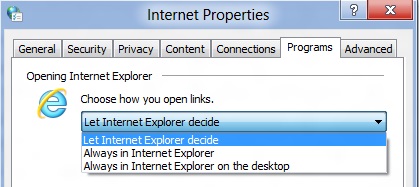
The most interesting part, actually, is in the settings - you can set links to default open in Fancy IE10, the desktop IE10, or let IE decide which to use on a contextual basis. You can also have the IE10 tile in Modern UI to open the desktop IE10, so you can basically ignore the new IE10 UI entirely should you want to do so. Now, I suspect this option exists primarily for desktop and notebook users of Windows 8, who don’t want to deal with using the Fancy IE10 interface with a mouse input. But it’s there for Windows RT users who want to use only the desktop IE10 UI. Personally, I wouldn’t want to use the classic interface in touchscreen devices - UI elements are damn small at this pixel density, making it more difficult to hit the right buttons than it needs to be. There’s a reason the Modern UI variant of IE10 exists.
Performance
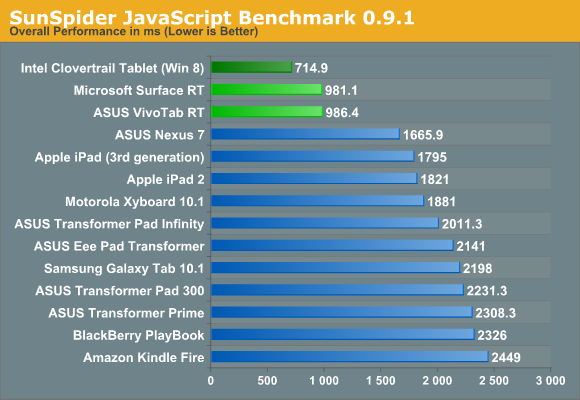
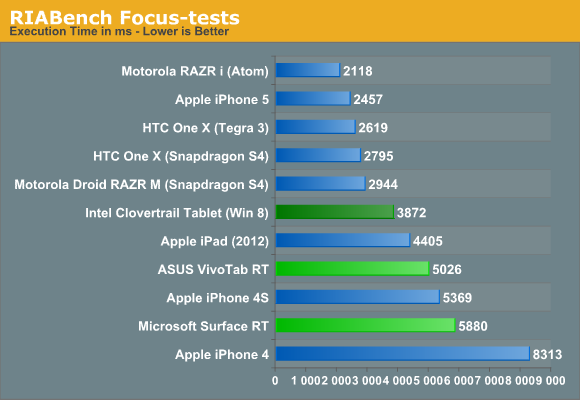
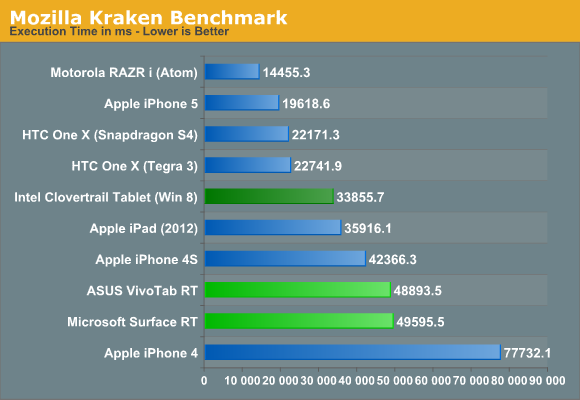
From a performance standpoint, we’ve just brought over the same three benchmarks that were used in the VivoTab RT and Surface RT reviews - SunSpider, RIABench, and Mozilla's Kraken. Honestly, I think SunSpider scores are becoming irrelevant - as one of our commenters said, the art of getting better SunSpider scores has started becoming a race to see who can cheat on the test most. Cheating in this case would be considered optimizing browsers for this specific test, and they’re not wrong. While IE10 has great, great SunSpider scores, it’s far behind in the other two JS benchmarks compared to similar hardware running on other platforms - look at the Surface or VivoTab RT compared to the international Tegra 3 version of the HTC One X. And I’m almost certain that if we had a Nexus 7 on hand to run those tests on, the differences would be larger still.
The HTML5 Test score 320 (plus 6 bonus points) is better than most tablet browsers from a year ago, but lags behind the latest mobile versions of Safari (386+9) and Chrome (390+11). Our Windows 8 Consumer Preview article showed that IE10 had made some pretty significant strides from IE9 (which was leaps and bounds better than 8, and then some) but JS performance is still behind the curve for now. The experience doesn’t suffer from that though - it’s still a very capable modern browser that won’t leave you disappointed.


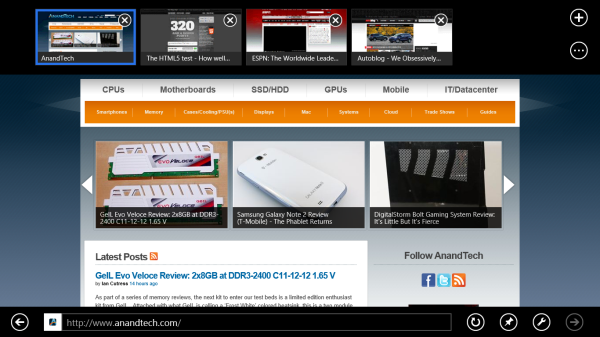








233 Comments
View All Comments
MadMan007 - Thursday, October 25, 2012 - link
I forgot about the base 10 versus base 2 conversion, which affects every single device of any kind out there (no one headline advertises base 2 sizes), but that still leaves over 4GB 'missing' even before the OS install. 4GB is a lot of non-video media or space for apps (I imagine app size is comarable to other ARM OSes because of Windows Phone.)Perhaps that's why we're seeing such memory sizes and pricing for Windows tablets, to make them comparable to other OSes, but companies can put flash for the same price in other tablets as well. Maybe they will and just enjoy better margins, or maybe they will and just price them lower.
daboochmeister - Thursday, October 25, 2012 - link
One of the things that's held me back from buying an Xbox is that it's $5/month to be a member of their community, so that you can chat with friends, have trophies saved, play multiplayer games, etc. As opposed to free with the Playstation Network, for example.Is there any kind of implicit tax like that in order to use this as a gaming device? If you don't have an Xbox and don't join any such paywall-portal, do you lose access to any games, or capability within any games you do have?
mcnabney - Thursday, October 25, 2012 - link
You will never install anything on RT that is not Microsoft approved and they will get a cut of the money too. Unsigned apps cannot be installed on RT - and only apps sold specifically to YOU on the MS App store are signed.But no, there won't be a monthly fee just to have a Surface tablet. The apps you want to run might...
Visual - Friday, October 26, 2012 - link
Uh... "you can chat with friends, have trophies saved" even without Xbox Live Gold. In other words, it is free. You only need to pay to play in multiplayer.aepxc - Thursday, October 25, 2012 - link
The review seems to indicate that Windows RT is an OS for desktop computing, but with a touch layer. But what does touch add to desktop computing? In what situations would a Windows RT tablet be preferable to a Windows 7 ultrabook? Or is it just a question of a Windows RT device being cheaper (especially taking into account the bundled Office) by much more than it is worse?VivekGowri - Thursday, October 25, 2012 - link
No? It's an OS for touch computing, with the traditional desktop layer underneath. I tried to spell that out as clearly as possible in the conclusion.aepxc - Thursday, October 25, 2012 - link
That's the argument that I did not really understand. To me, the clearest distinction between computing pre-Android/iOS and the computing those OSs have now enabled, lies not in how you do things (with gestures and touch) but in what you do. I used "desktop computing" in my initial post in the sense of activities one would do at a desk, to the exclusion of the outside environment. Android and iOS ('mobile', 'post-PC', whatever) seem to me to instead focus on tasks that augment one's environment. Google Now or the iPad's use as a flight bag, or Kindle's textbooks (or even messaging services that are more SMS than IRC in spirit) would, to me, be emblematic of the new approach.What you praise WinRT for -- multitasking, (computer-centric) productivity, etc. would to me be very 'desktop' (again, in the sense above) centred. Given that, they are already very well (IMHO, better) served by Win7. Hence my original question -- what does touch (especially at the expense of lower power and a smaller screen) bring to the game? What does it do better than an ultrabook?
ludikraut - Thursday, October 25, 2012 - link
Having used the Windows 8 beta on an Asus EP121 tablet, I can attest to what Vivek is saying. To me Windows 8 (any version) on a tablet, at a minimum, extends the capability of what we might call the 'traditional' tablet (e.g., iPad, Andriod) by allowing me to use it effectively for productivity apps like Office. Trying to write long e-mails, online posts, word docs, etc. on an iPad, for example, is an exercise in extreme frustration to me. No such issue on Win8.So to me Windows RT offers an expanded tablet experience, if you will, and full-blown Windows 8 on a powerful tablet allows me to ditch all of my other tablets and notebooks in favor of a single device. A Haswell version of something like the Asus Transformer Book is what I'll be waiting for.
l8r)
steven75 - Friday, November 2, 2012 - link
"Trying to write long e-mails, online posts, word docs, etc. on an iPad, for example, is an exercise in extreme frustration to me."And why are the same not any issue on Windows RT? Because you connected a hardware keyboard?
Then why not do the same with an iPad?
karasaj - Thursday, October 25, 2012 - link
Well for starters (imo), battery life and portability. Find a 600$ ultrabook constructed as well as surface. You won't. Many people have given it the same quality as Apple's products.You can't compare things one to one and expect something reasonable. In a world where surface and ultrabooks are the only things that exist, and specs are all that matters, yes, ultrabooks come out on top.
Look at the ipad though. Sure, it has apps. But x86 has WAY more. x86 is WAY more powerful. But more people buy the iPad than many windows computers. Tablets (despite being low power) are cannibalizing the PC market. Why is this?
All day battery life, family friendly media consumption, etc. Sure, an ultrabook does all of this - so why doesn't it sell as well? Tablets have a certain appeal - being able to sit in bed and lay on your side and watch netflix without worrying about a keyboard for example. Having 10+ hours of battery life while internet browsing (many notebooks, even ultrabooks, achieve half that).
Now look at Surface. Don't compare it JUST to an ultrabook. Do both. It's bringing a level of productivity to tablets that never existed. I (as a student) can take Surface and take notes with it in class on Office, and watch movies in bed with it. Tablet's have an appeal because they excel at their tasks - media consumption and (now) basic productivity. You don't *need* more power for those things. If you have more complex needs, then of course you need a laptop.
But if all you do is Netflix, office, and the occasional game, + internet browsing, (me), there's no difference. Surface can do all that and be more or less just as smooth. Applications might take longer to load, but that's a one time thing that can even be improved with software optimization. I have a desktop for more powerful needs (gaming, programming).
PCs have always been more powerful, but their sales are declining. That's because the average consumer (a media consumer, not a power user) puts more emphasis on portability than having a quad core i7 - they don't need that much power.